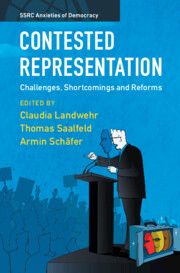Book contents
- Contested Representation
- SSRC Anxieties of Democracy
- Sponsored by the Social Science Research Council
- Contested Representation
- Copyright page
- Contents
- Figures
- Tables
- Contributors
- Acknowledgments
- 1 Introduction
- Part I The Contested Idea of Political Representation
- Part II Representation and Responsiveness in Unequal Societies
- Part III Polarization, New Cleavages, and Shifts in Democratic Government
- 11 Policy and Politics in Disjuncture in an Age of Secular Stagnation
- 12 Polarization and the Making and Breaking of Governments in European Parliamentary Democracies
- 13 Is Populism a Threat or a Chance for Representative Democracy?
- Part IV Constitutional Crisis and Institutional Reform
- Bibliography
- Index
12 - Polarization and the Making and Breaking of Governments in European Parliamentary Democracies
from Part III - Polarization, New Cleavages, and Shifts in Democratic Government
Published online by Cambridge University Press: 03 November 2022
- Contested Representation
- SSRC Anxieties of Democracy
- Sponsored by the Social Science Research Council
- Contested Representation
- Copyright page
- Contents
- Figures
- Tables
- Contributors
- Acknowledgments
- 1 Introduction
- Part I The Contested Idea of Political Representation
- Part II Representation and Responsiveness in Unequal Societies
- Part III Polarization, New Cleavages, and Shifts in Democratic Government
- 11 Policy and Politics in Disjuncture in an Age of Secular Stagnation
- 12 Polarization and the Making and Breaking of Governments in European Parliamentary Democracies
- 13 Is Populism a Threat or a Chance for Representative Democracy?
- Part IV Constitutional Crisis and Institutional Reform
- Bibliography
- Index
Summary
The transition to globalized knowledge economies in recent decades have accelerated economic and social change across the globe.1 European democracies have been no exception to these developments. They have experienced rapid structural changes to their economies, increased social inequality, new social cleavages (see, for example, Chapter 11) and growing ethnic diversity resulting from migration. These changes have had political repercussions, including growing support for politically extreme challenger parties and the rise of populist political entrepreneurs in many countries (Iversen and Soskice 2019; Proaño, Peña and Saalfeld 2019; de Vries and Hobolt 2020). Some authors have even argued that the nature of partisan conflict itself has changed. While traditionally most European party systems were dominated by a socio-economic conflict between left-wing parties supporting tax-funded expansion of the welfare state and Keynesian economic policy and right-wing parties advocating a free-market economy (Laver and Hunt 1992), new voter coalitions have emerged (Hillen and Steiner 2019) and, in some cases, new challenger parties have been found to exploit a new ‘universalism-particularism’ dimension in political conflict (Häusermann and Kriesi 2015). Where it has become politically relevant, this additional dimension of conflict has added further complexity to political competition in European democracies.
- Type
- Chapter
- Information
- Contested RepresentationChallenges, Shortcomings and Reforms, pp. 211 - 231Publisher: Cambridge University PressPrint publication year: 2022

